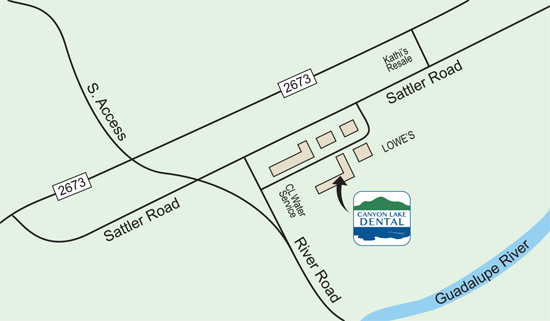Professional restorative dentistry in Canyon Lake, TX
Treating your smile right
Restorative dentistry is for the diagnosis and treatment of teeth and gum disease, including aesthetically.
If you are looking for a practice experienced in restorative dentistry, then you need to come see our team of specialists in Canyon Lake, TX. We're experts in such restorative procedures as crowns, bridges and composite fillings.
You'll find more details on these procedures here.
Crowns
A crown, sometimes referred to as a 'cap', is a restorative dentistry procedure used to re-create the original size and shape of a tooth. While crowns are well known for their cosmetic benefits, they are important for a number of reasons:
- Restore the appearance of your smile
- Protect damaged or decayed teeth
- Restore the natural bite, thereby improving the ability to chew and eat
- Cover dental implants
- Protect the position and shape of the teeth
Our dental practice in Canyon Lake can describe these benefits to you in more detail.
Bridges
If you're missing one or more of your teeth, this not only affects the appearance of your smile, but also affects your dental and overall health. You may encounter:
- Misalignment of teeth
- Increased risk of periodontal disease
- Increased risk of tooth decay
- Loss of adjacent teeth
- Speech disorders
- Temporomandibular joint disorder (TMJ)
Our restorative dentistry practice in Canyon Lake will help you achieve the benefits of dental bridges:
- Aesthetic appearance
- Helping prevent surrounding teeth from moving out of position
- Improving ability to chew and eat
- Maintaining the shape of face
Composite fillings
Even if you follow good oral hygiene you may experience tooth decay. This tooth decay must be 'stopped or controlled' before further damage occurs.
One of the best and most common forms of treating minor tooth decay is to use composite fillings.
For decades having teeth fillings meant having a mouth full of metal fillings. Advances in technology using composite fillings have improved the results drastically.
With composite fillings you'll not only protect teeth against further decay, but you'll also have no noticeable trace of the procedure. Composite fillings can be 'matched' to a patients existing teeth color and shape.
More about Bridges
What Are Dental Bridges?
Like dental implants, dental bridges are used to replace a missing tooth, except bridges are supported by the teeth on either side called abutment teeth.
What Are the Benefits of Bridges?
Like many cosmetic dental procedures, placing bridges also serves a restorative purpose. A dental bridge will improve your ability to chew and speak as well as your smile. In a recent study published in the Journal of the American Dental Association, dental bridges were shown to dramatically reduce the risk of losing teeth that are adjacent to a missing tooth. In addition, dental bridges can help keep your jaw and face from changing shape, as they tend to do when a person has missing teeth.
What Types of Bridges Are There?
- Cantilever bridges are used to replace a tooth that does not have supporting teeth on both sides of the affected area.
- Maryland bonded bridges include artificial teeth and gums, and are held in place by a metal frame.
- Traditional bridges are the most common, and literally bridge the gap of an empty tooth space by securing a false tooth using crowns on the teeth on either side.
How Are Dental Bridges Placed?
The procedure of installing a dental bridge is typically completed in two visits. First, your dentist will determine if you are a good candidate for a dental bridge. If you are, your teeth will need to be prepared by reshaping or reconstructing any badly decayed or damaged areas. Afterward, your dentist will take an impression of your teeth, which is then sent off to a lab where it is cast into a mold, and give you a temporary bridge to wear. On your second visit, this mold will be fitted to your teeth, and any necessary corrections or adjustments will be made on that same visit.
How Long Do Dental Bridges Last?
Dental bridges can last from 8 to 15 years and can last even longer if you maintain good oral hygiene by brushing and flossing regularly.

